2021 年四川省遂宁市中考英语真题及答案
本试卷分为五个部分。满分 150 分,考试时间 120 分钟。
注意事项:
1.答题前,考生务必将自己的学校、姓名、准考证号用 0.5 毫米的黑色墨水签字笔填写在
答题卡上,并检查条形码粘贴是否正确。
2.回答选择题时,选出每小题答案后,用 2B 铅笔把答题卡上对应题目的答案标号涂黑。如
需改动,用橡皮擦干净后,再选涂其他答案标号;回答非选择题时,将答案写在答题卡
上,写在本试卷上无效。
3.考试结束后,将本试卷和答题卡一并交回。
第一部分 听力(共两节,满分 30 分)
做题时,先将答案标在试卷上。听力部分结束前,你将有两分钟的时间将试卷上的答案
转涂到答题卡上。
第一节(共 5 小题;每小题 1.5 分,满分 7.5 分)
听下面 5 段对话,每段对话后有一个小题,从题中所给的 A、B、C 三个选项中选出最佳
选项,并标在试卷的相应位置。听完每段对话后,你都有 10 秒钟的时间来回答有关小题和
阅读下一小题。每段对话读两遍。
1. How often does Tim go to the old people’s home?
A. Once a month.
B. Twice a month.
C. Twice a year.
2. Who is the man with glasses?
A. Bob’s chemistry teacher.
B. Bob’s math teacher.
C. Bob’s
history teacher.
3. Where is the supermarket?
A. In front of the hotel.
B. Next to the hotel.
C. Across
from the hotel.
4. Whose dictionary might it be?
A. Tina’s.
B. Jack’s.
C. Mary’s.
5. What makes Sam happy?
A. Passing the exam.
B. Having a party.
C. Getting the
first prize.
第二节(共 15 小题;每小题 1.5 分,满分 22.5 分)
�
听下面 5 段对话或独白。每段对话或独白后有几个小题,从题中所给的 A、B、C 三个选项
中选出最佳选项,并标在试卷的相应位置。听每段对话或独白前,你将有时间阅读各个小题,
每小题 5 秒钟;听完后,各小题将给出 5 秒钟的作答时间。每段对话或独白读两遍。
听下面一段对话,回答第 6、7 两个小题。
6. Where is Tom going for his summer vacation?
A. Countryside.
B. America.
C. Disneyland.
7. How long will he stay there?
A. For 10 days.
B. For 7 days.
C. For 20 days.
听下面一段对话,回答第 8、9 两个小题。
8. What’s wrong with the boy?
A. He has a stomachache.
B. He has a headache.
C.
He
has
a
toothache.
9. What does the doctor ask him to do?
A. Lie down and rest.
B. Drink some hot water.
C. Take some
medicine.
听下面一段对话,回答第 10 至 12 三个小题。
10. What’s the boy doing now?
A. Talking on the phone.
B. Reading news.
C. Listening to the
radio.
11. How is the boy going to achieve his dream?
A. Study cooking.
B. Study farming.
C.
Study
medicine.
12. What does the girl want to be?
A. A scientist.
B. A cook.
C. A nurse.
听下面一段对话,回答第 13 至 15 三个小题。
13. What time did Tony start to use the phone?
A. At 2 o’clock.
B. At 3 o’clock.
C. At 5 o’clock.
14. What kind of shows does Tony like best?
A. Talk shows.
B. Sports shows.
C. Game shows.
15. What will Tony and his mom do next?
A. Play ping-pong.
B. Take a walk.
C. Do homework.
听下面一段独白,回答第 16 至 20 五个小题。
16. How many teams took part in the dragon boat races?
A. 22.
B. 28.
C. 26.
17. How did Zhang Meng come to Suining?
�
A. By train.
B. By car.
C. By bus.
18. What was the weather like that day?
A. Cloudy and cool.
B. Sunny and hot.
C.
Rainy
and
cold.
19. What did Zhang Meng and her family do?
A. They went boating.
B. They won the games.
C. They took
photos.
20. How did Zhang Meng feel?
A. Tired.
B. Moved.
C. Excited.
第二部分 英语知识运用(共两节,满分 30 分)
第一节 单项填空(共 10 小题;每小题 1 分,满分 10 分)
从 A、B、C、D 四个选项中,选出可以填入空白处的最佳选项,并在答题卡上将该选项
涂黑。
21.
I bought a skirt for
. I hope you like
.
— Thank you, mom. I can’t wait to try it on.
A. you; one
B. you; it
C. me; one
D.
me;
it
22.
he number of the whales
smaller and smaller because of human activities now.
A. were
B. was
C. is
D.
are
23.
What’s
mountain in the world?
— Qomolangma. It is 8848.86 meters high according to the latest report.
A. higher
D. high
24.
B. highest
C.
the
highest
My parents don’t allow me
my phone on school days.
— They are strict. But they always want the best for you.
A. to use
B. use
C. using
D. used
25.
o celebrate the 100th birthday of the Communist Party of China, a speech competition
in our school last week.
A. hold
was held
B. held
C. is held
D.
—
T
—
—
T
�
26. Our headmaster asks us to watch news every day
we can find out what’
s going on
around the world.
A. so that
B. even though
C. in order to
D.
instead of
27. — He has made many friends since he came here three weeks ago.
—
outgoing boy he is!
A. How a
B. How
C. What a
D. What an
28. — I ______ when you called me at 8:00 last night.
— No wonder you didn’t pick it up.
A. was taking a shower
B. am taking a shower
C. took a shower
D. take a
shower
29. — About the Chinese Dream, could you please tell us
, Mr. Wang?
— By pulling together.
A. how can we make it come true
B. how we can make it come true
C. when can we make it come true
D. when we can make it come true
30. — Would you mind lending me your ruler?
—
Here you are.
A. Of course not.
B. I don’t agree.
C. That’s all right.
D. Yes,
I’d love to.
第二节 完形填空(共 20 小题;每小题 1 分,满分 20 分)
阅读下面短文,从短文后各题所给的四个选项(A、B、C、D)中,选出可以填入空白处
的最佳选项,并在答题卡上将该选项涂黑。
Everyone admires heroes. When we are asked
31
are our heroes, someone
well-known
like Yang Liwei or Zhong Nanshan may come into mind. They make a big difference to
the
world.
32
, there are “everyday” heroes in our daily life. They may not be so
33
to the public, but these common people are also working hard to build a better
world.
34
them is Sun Jun.
Sun Jun comes from a poor village. The villagers used to have no enough food.
He knew much about the
35
. He learned to
36
food at his early age.When he
was a college student, he found that the problem of food waste was more and more
37
. He started to
38
unsold food from restaurants and stores for homeless
people.
After graduating, Sun Jun joined a volunteer
39
called Green Food Bank,
which was set up in Shanghai in 2014. The purpose of the organization is to build
�
a bridge between people who are ready to help others and those who are
40
. It
works by collecting and
41
free food for the poor, the disabled and so on.
Sun’s team developed a phone app. It can show how much food restaurants remain
each day. Usually, the workplaces of volunteers are not far from the restaurants,
42
they can just walk there to get the food for free. Then it can be given out
in just a few
43
.
So far, Sun and his team have done something
44
to the society. On the one
hand, they’ve saved a lot of food. On the other hand, they’ve helped some people
45
. More volunteers and restaurants join them now. The small actions of these
heroes can make a
Why does Sun do
46
47
influence than we imagine.
these things? He says, “Thanks to Grandpa Yuan Longping,
we are almost no longer short of food. We need to think about how to
48
wasting.
There’s a long way to go, but I won’t
49
halfway. It’s just the beginning.
We still have
50
to do.”
31. A. that
B. what
C. who
D. which
32. A. However
B. But
C. Though
D. Or
33. A. friendly
B. polite
C. famous
D. smart
34. A. Among
B. Between
C. For
D. Without
35. A. danger
B. hunger
C. nature
D. culture
36. A. make
B. waste
C. use
D. save
37. A. different
B. popular
C. serious
D. difficult
38. A. eat
B. collect
C. cook
D. taste
39. A. party
B. club
C. organization
D. school
40. A. in need
B. in silence
C. in excitement
D. in surprise
41. A. providing
B. buying
C. selling
D. borrowing
42. A. until
B. if
C. because
D. so
43. A. weeks
B. hours
C. days
D. months
44. A. careful
B. peaceful
C. meaningful
D. awful
45. A. successfully
B. suddenly
C. slowly
D. quietly
46. A. worse
B. smaller
C. fewer
D. greater
47. A. both
B. every
C. either
D. all
48. A. begin
B. stop
C. continue
D. consider
49. A. give up
B. put up
C. give out
D. make up
50. A. everything
B. nothing
C. much
D. little
�
第三部分 阅读理解(共 20 小题;每小题 2 分,满分 40 分)
阅读下列短文,从每题所给的四个选项(A、B、C、D)中,选出最佳选项,并在答题卡
上将该选项涂黑。
A
Welcome to www.youthtravel.com! Would you like to join us this summer vacation?
Here are tours of four amazing museums. You can not only enjoy your life, but also
learn something interesting.
The Underwater Museum
The Museum of Movies
Time: July 5-10
Age: 8-18
Ticket: ¥50
Time: July 16-21
Age: 8-15
Ticket: ¥20
You can enjoy fishes in different
This is a museum about movies and
colors. There are also excellent dolphin
cameras. It has very old cameras and you
shows. If you are brave enough, have a try
can learn a lot about the history of
to swim underwater to see the sea life
them. To relax yourself, you may watch
clearly. Buy some gifts for your family
famous movies from all over the world.
if necessary.
The China(瓷器)Museum of the Song Dynasty
Suining Science and Technology Museum
Time: August 3-8
Age: 12-18
Ticket: free
Time: August 23-28
Age: over 6
Ticket: free
More than 120 china pieces from
You may learn something about the
ancient China are on show here. You can
space
and
increase
your
science
make your own clay art works in person
knowledge. You can experience wonderful
at a very good price. Come and have fun
activities such as VR games, driving
with your friends! It is open every day
games, recycling
games
and
so on.
except Monday.
Children under 12 must be with at least
one adult.
51. Jenny is a 7-year-old girl. Which museum can she visit?
A. The Underwater Museum.
B. The Museum of Movies.
C. The China Museum of the Song Dynasty.
D.
Suining
Science
and
Technology Museum.
52. If a boy has an interest in the old cameras,he can go to the museum on
A. July 6
B. August 5
C. July 18
.
D.
August 24
�
53. Helen wants to visit the Underwater Museum with her classmate Sally. How much
do they have to pay?
A. ¥100.
B. ¥50.
C. ¥20.
D. ¥150.
54. At Suining Science and Technology Museum, you can
.
A. make clay art pieces
B. swim underwater
C. experience VR games
D. watch movies
55. The reading may come from
.
A. a textbook
B. a storybook
C. a science fiction
D.
the Internet
B
Do you know Liu Xiuxiang? This name might be strange to you, but you must have
heard about the story of him. He “carried” his sick mom to his university while
he studied in Shandong. His mom wasn’t able to look after herself after his dad
passed away. He had to support the whole family. Life was difficult, but he went
on studying hard. Finally, he got into the university.
Many years later, Liu was noticed by public again. He won the honor — the “May
4th Medal of Chinese Youth”. After he graduated from university in 2012, Liu refused
many highly-paid jobs and went back to his hometown, Guizhou Province. There he has
been working as a teacher for 9 years. He said, “I hope to do something for more
children whose lives are similar to mine.”
In fact, Liu supported three poor children when he was in high school. Till now,
he has helped more than 1,700 students and given more than 1,000 speeches. His story
has warmed many people. As the song sings, “What doesn’t kill you makes you
stronger. ” There is no doubt that he will give more hope to more children in the
future.
56. Why did Liu Xiuxiang “carry” his mom to the university?
A. Because his mom couldn’t take care of herself.
B. Because his mom wanted to work in the university.
C. Because his mom was too lonely.
D. Because Liu was not independent.
57. Liu Xiuxiang worked as_______ after he graduated from the university.
A. a policeman
B. a doctor
C. a teacher
D.
an
officer
58. Where is Liu Xiuxiang’s hometown?
A. In Shandong.
B. In Guizhou.
C. In Sichuan.
D.
In
�
Henan.
59. When did Liu start to support poor children?
A. When he graduated from university in 2012.
B. After he won the May 4th Medal of Chinese Youth.
C. When he got into the university.
D. When he was a high school student.
60. What do you think of Liu Xiuxiang?
A. Kind and helpful.
B. Honest and brave.
C. Polite and responsible.
D. Hard-working and shy.
C
Several months ago, Chinese COVID-19 vaccines(疫苗)were put to use widely.
Our government offers free vaccines to Chinese people. Here is some information you
need to know.
How is the vaccine given?
It is given by injection(注射).There are several ways to get injected. For the
most common way, you are supposed to get it twice. After the first injection, you
have to wait for about three weeks to get the second one.
Is the vaccine bad for human bodies?
Some people are afraid that the vaccines are dangerous and may make them sick.
In fact, the vaccines have been tested for a long time. They won’t cause any disease.
Instead, they can protect our bodies from being hurt.
Who is suitable?
Medical researches have shown that Chinese vaccines are suitable for most people.
And people aged 18 to 59 would be the first ones to get injection. Our government
expects people over 60 who are in good health to get injected as well. You’d better
ask doctors for advice at first.
Should we still wear a face mask?
Yes. It takes a few weeks for the body to build the ability to fight the COVID-19
after injection. Sometimes the vaccines might not work well in the body. So it’
s best to keep wearing face masks in public and wash your hands often.
61. _________ can get the COVID-19 vaccines first in China .
A. People of all ages
B. People aged 3 to 17
C. People aged 18 to 59
D. People aged 60 and above
62. The underlined word “disease” means __________ in the passage.
A. illness
B. trouble
C. headache
D. pressure
63. From the passage, we can know that the vaccines __________.
A. will make people sick
B. can protect people from being
�
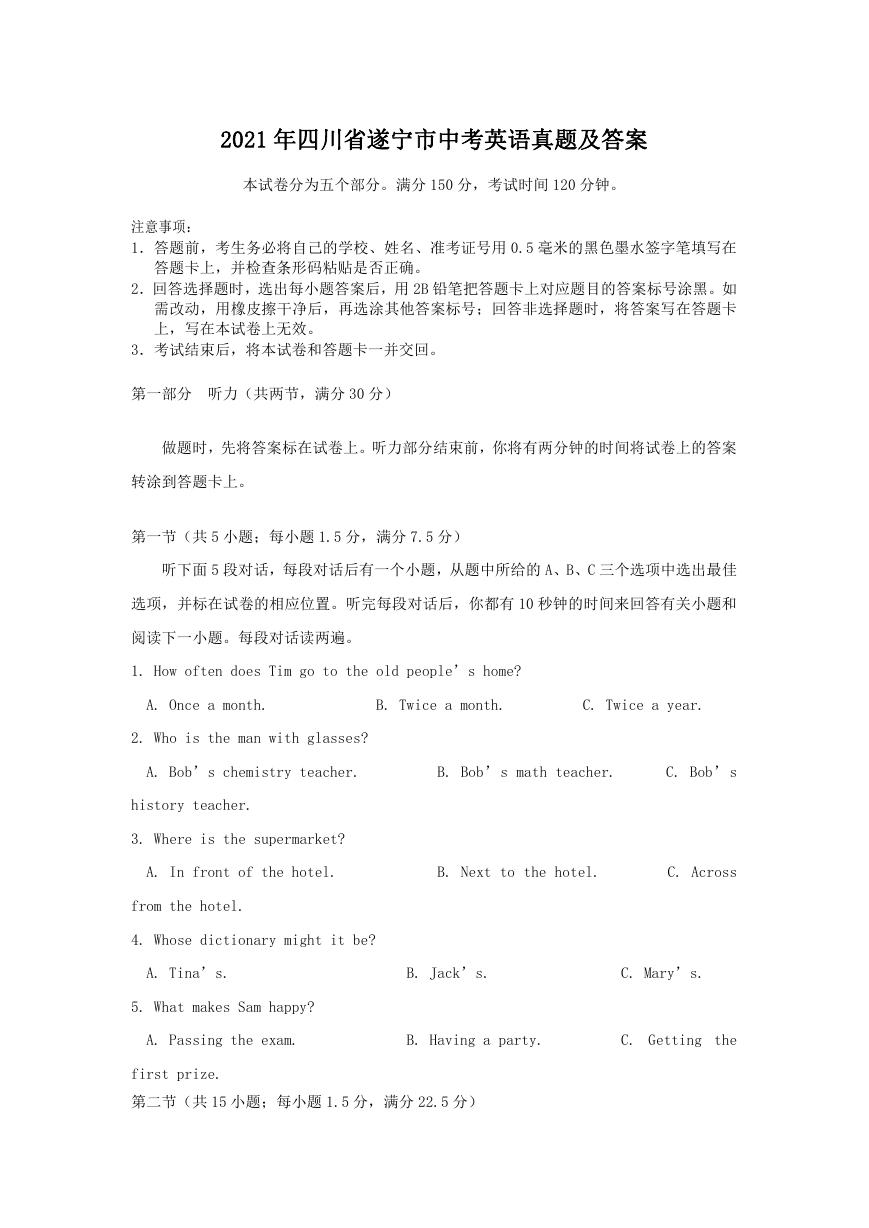
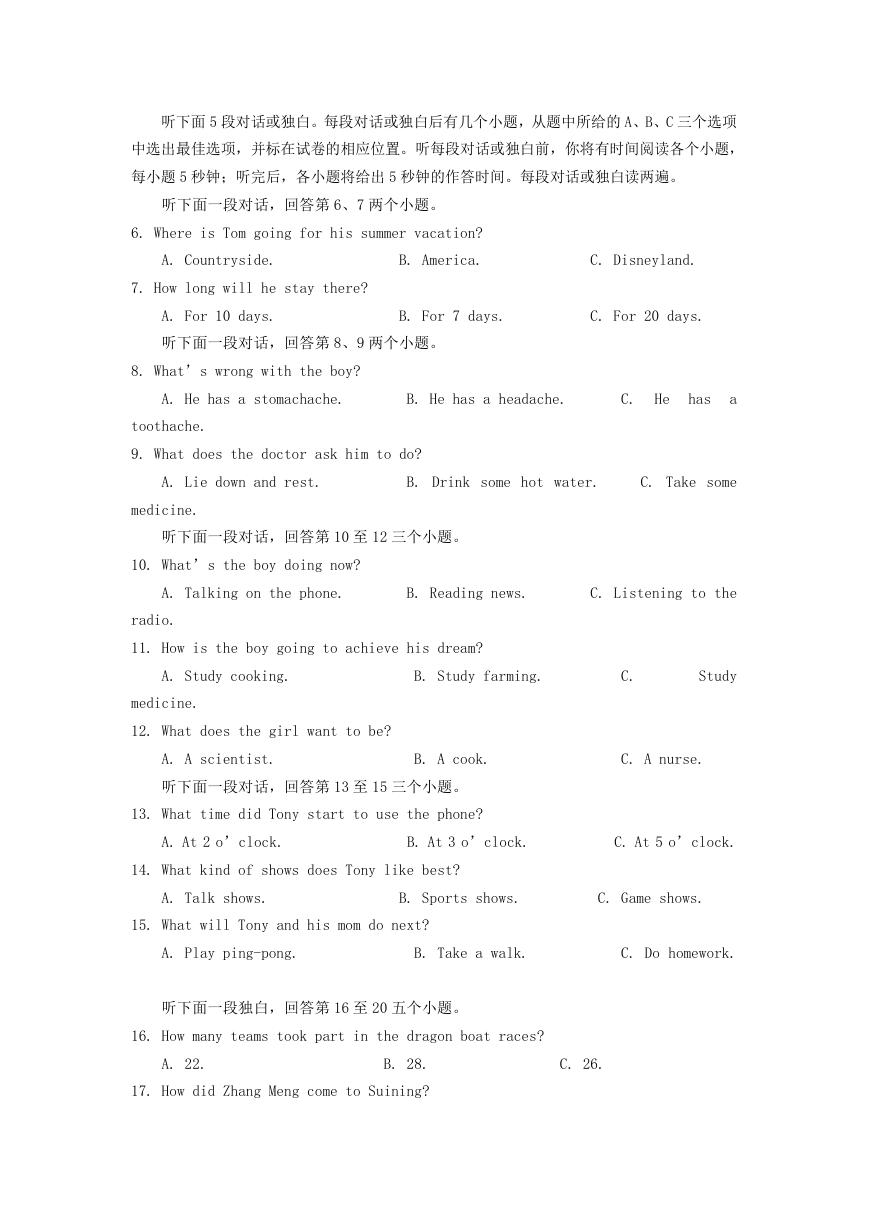
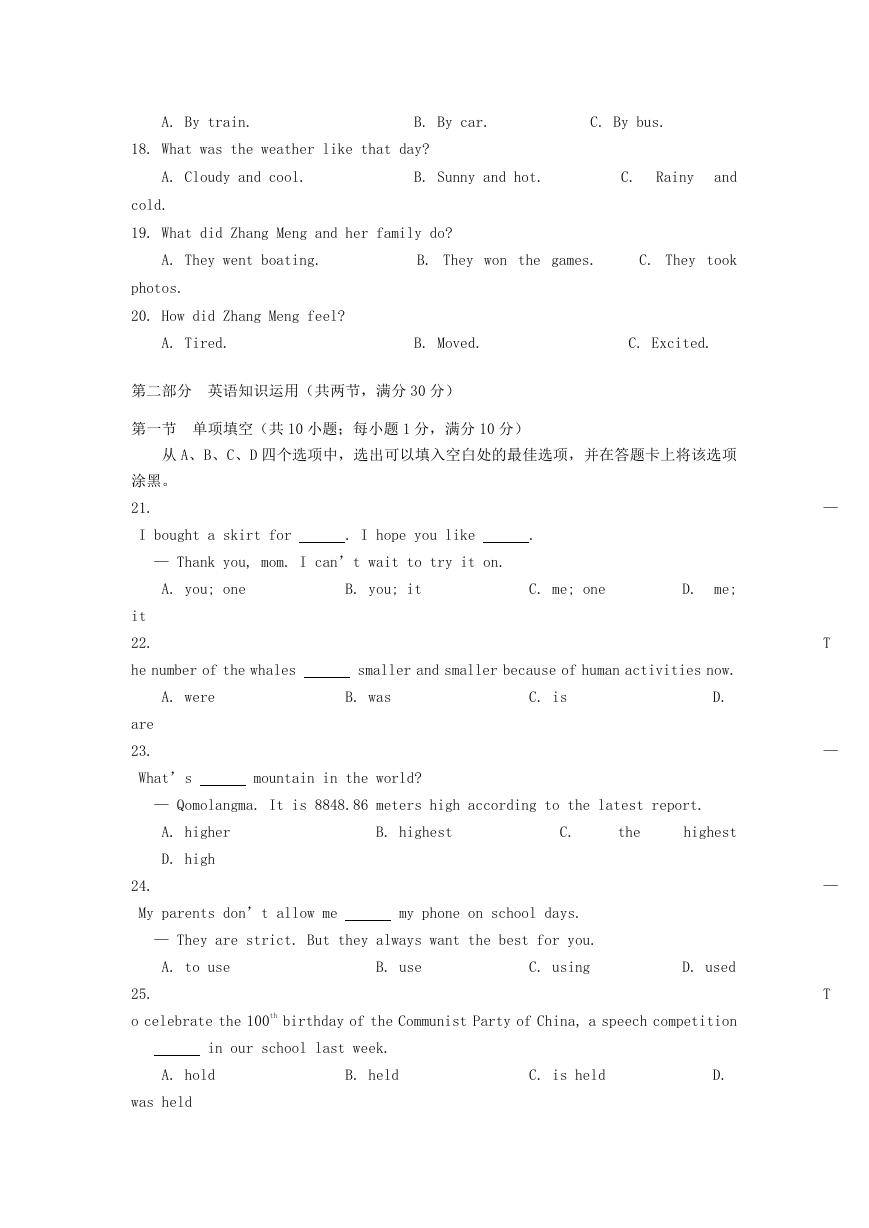
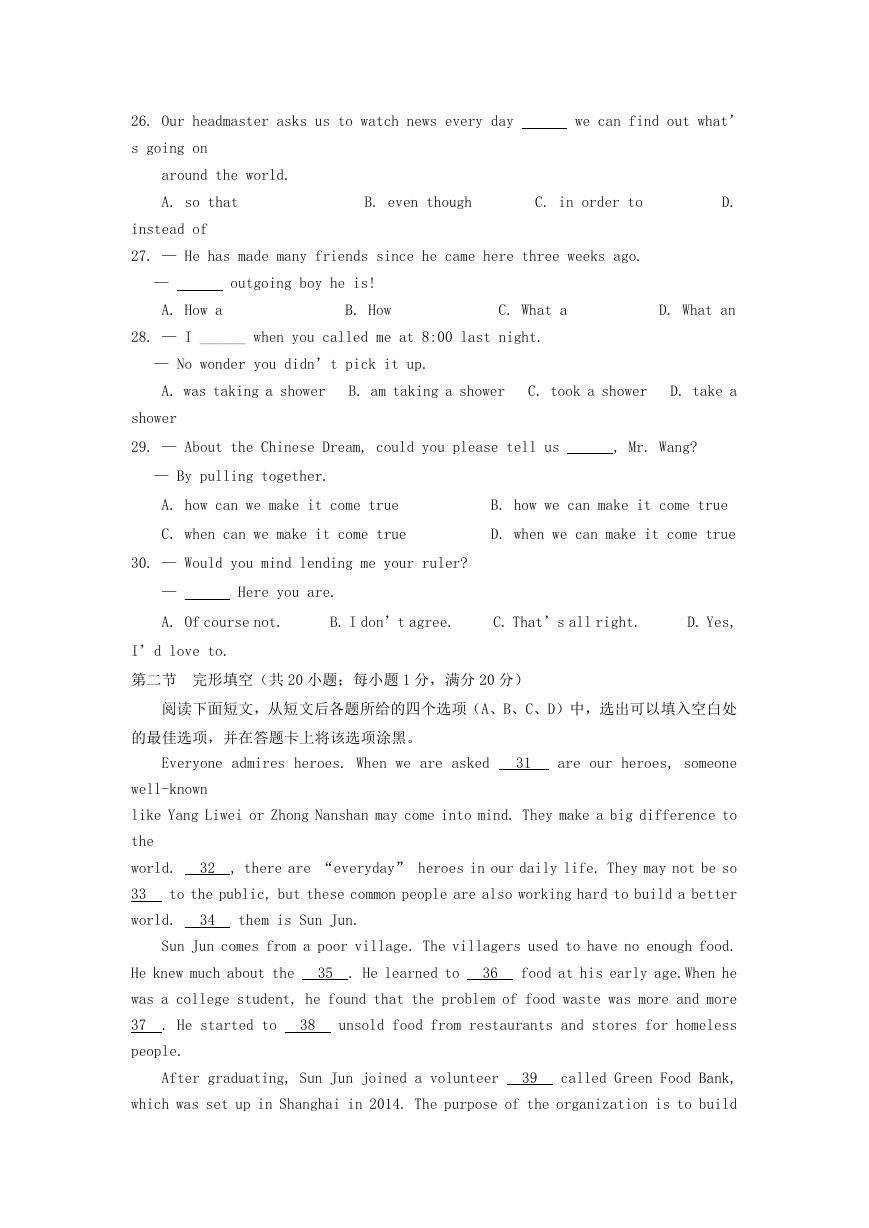
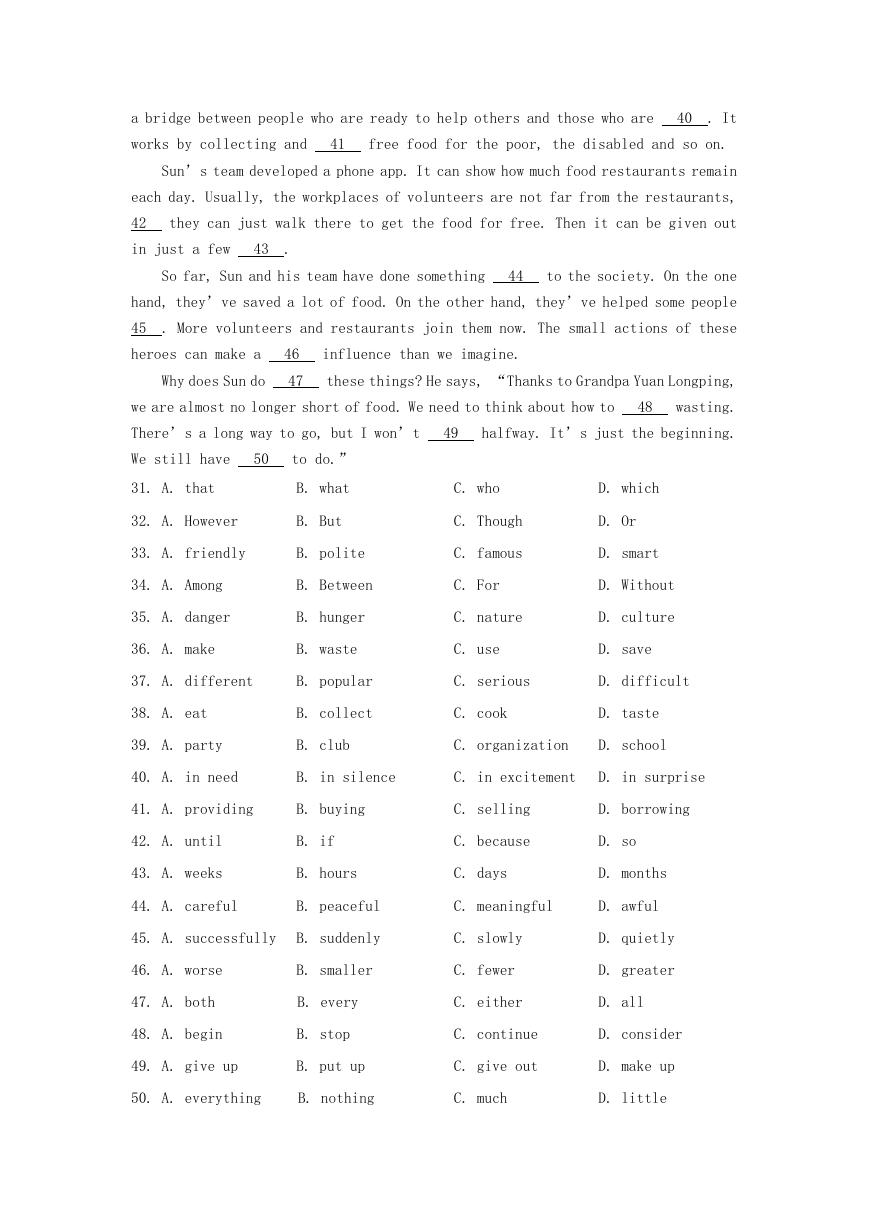
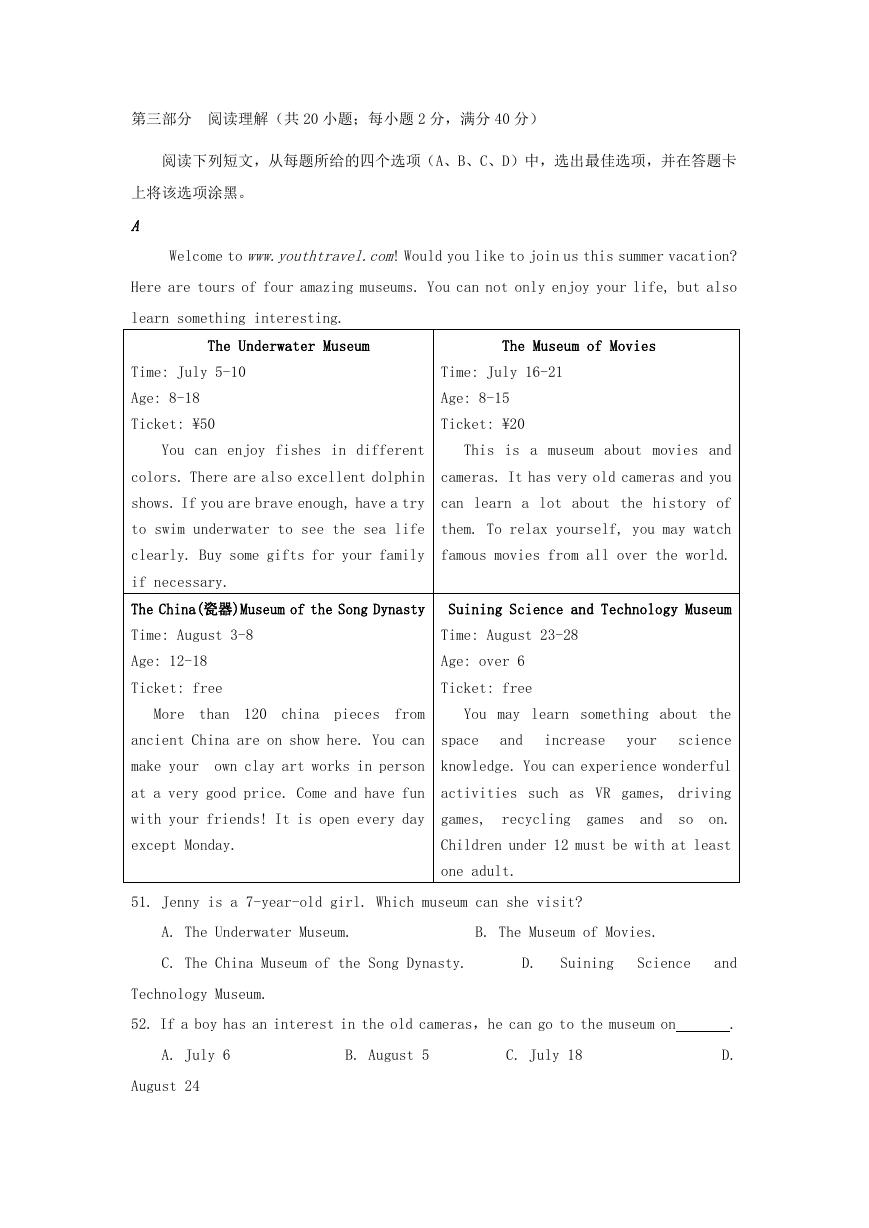
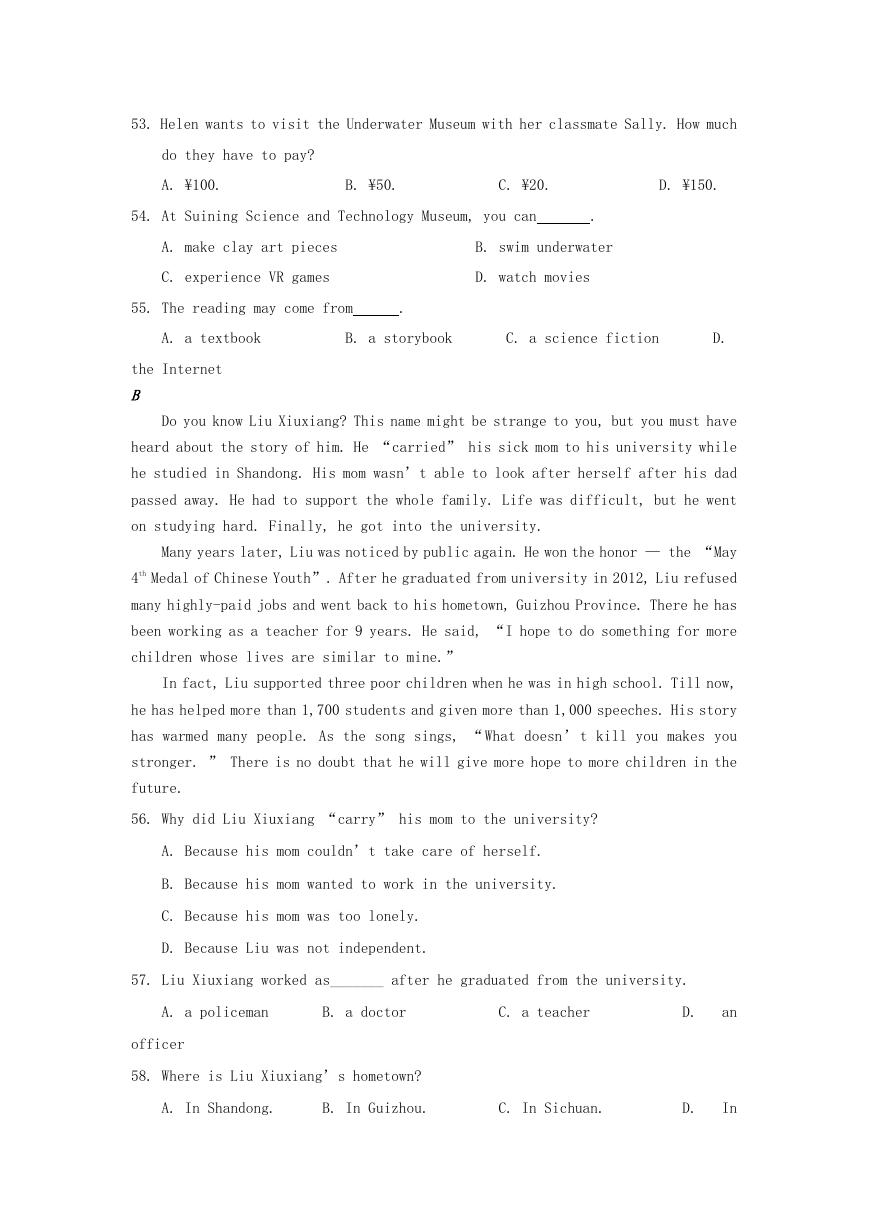
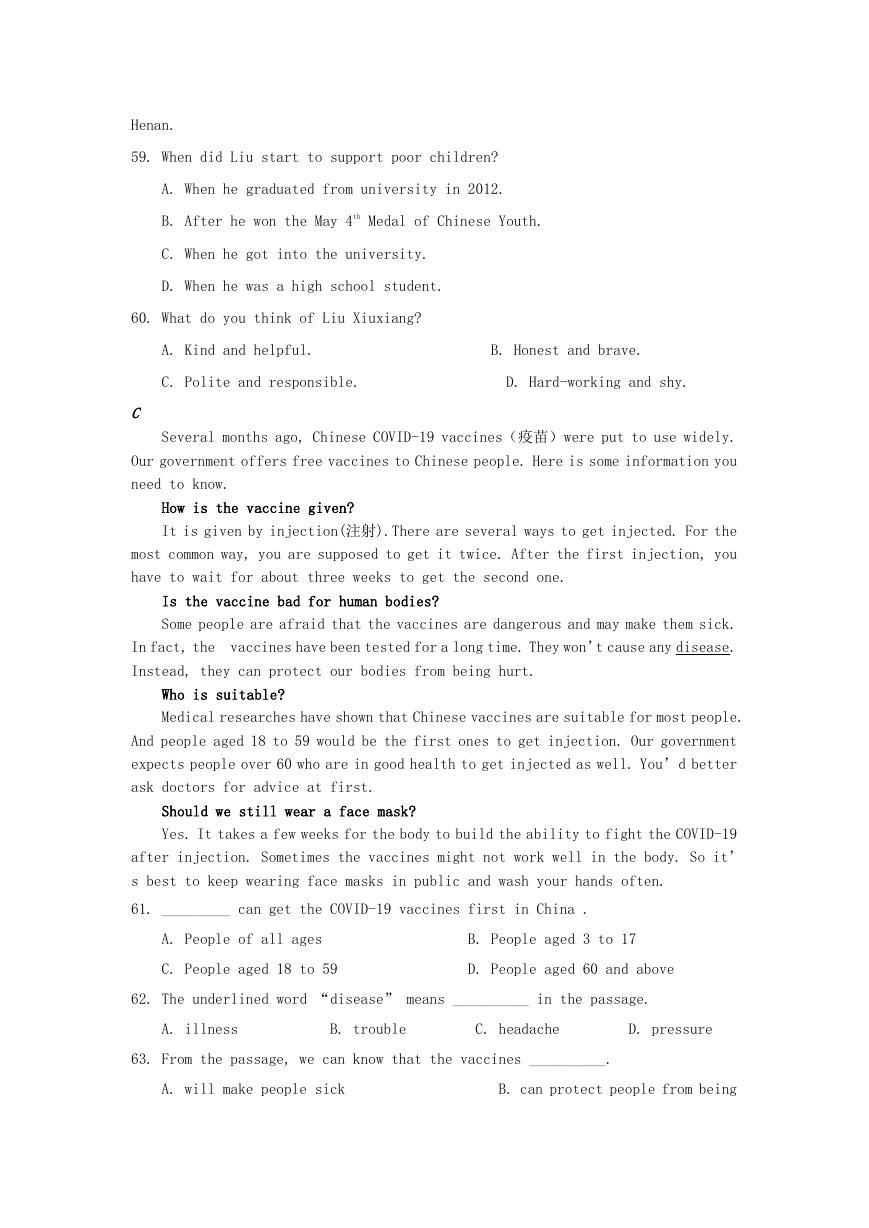








 2023年江西萍乡中考道德与法治真题及答案.doc
2023年江西萍乡中考道德与法治真题及答案.doc 2012年重庆南川中考生物真题及答案.doc
2012年重庆南川中考生物真题及答案.doc 2013年江西师范大学地理学综合及文艺理论基础考研真题.doc
2013年江西师范大学地理学综合及文艺理论基础考研真题.doc 2020年四川甘孜小升初语文真题及答案I卷.doc
2020年四川甘孜小升初语文真题及答案I卷.doc 2020年注册岩土工程师专业基础考试真题及答案.doc
2020年注册岩土工程师专业基础考试真题及答案.doc 2023-2024学年福建省厦门市九年级上学期数学月考试题及答案.doc
2023-2024学年福建省厦门市九年级上学期数学月考试题及答案.doc 2021-2022学年辽宁省沈阳市大东区九年级上学期语文期末试题及答案.doc
2021-2022学年辽宁省沈阳市大东区九年级上学期语文期末试题及答案.doc 2022-2023学年北京东城区初三第一学期物理期末试卷及答案.doc
2022-2023学年北京东城区初三第一学期物理期末试卷及答案.doc 2018上半年江西教师资格初中地理学科知识与教学能力真题及答案.doc
2018上半年江西教师资格初中地理学科知识与教学能力真题及答案.doc 2012年河北国家公务员申论考试真题及答案-省级.doc
2012年河北国家公务员申论考试真题及答案-省级.doc 2020-2021学年江苏省扬州市江都区邵樊片九年级上学期数学第一次质量检测试题及答案.doc
2020-2021学年江苏省扬州市江都区邵樊片九年级上学期数学第一次质量检测试题及答案.doc 2022下半年黑龙江教师资格证中学综合素质真题及答案.doc
2022下半年黑龙江教师资格证中学综合素质真题及答案.doc